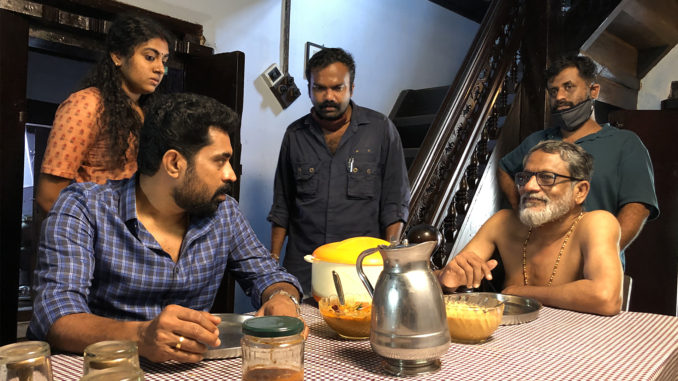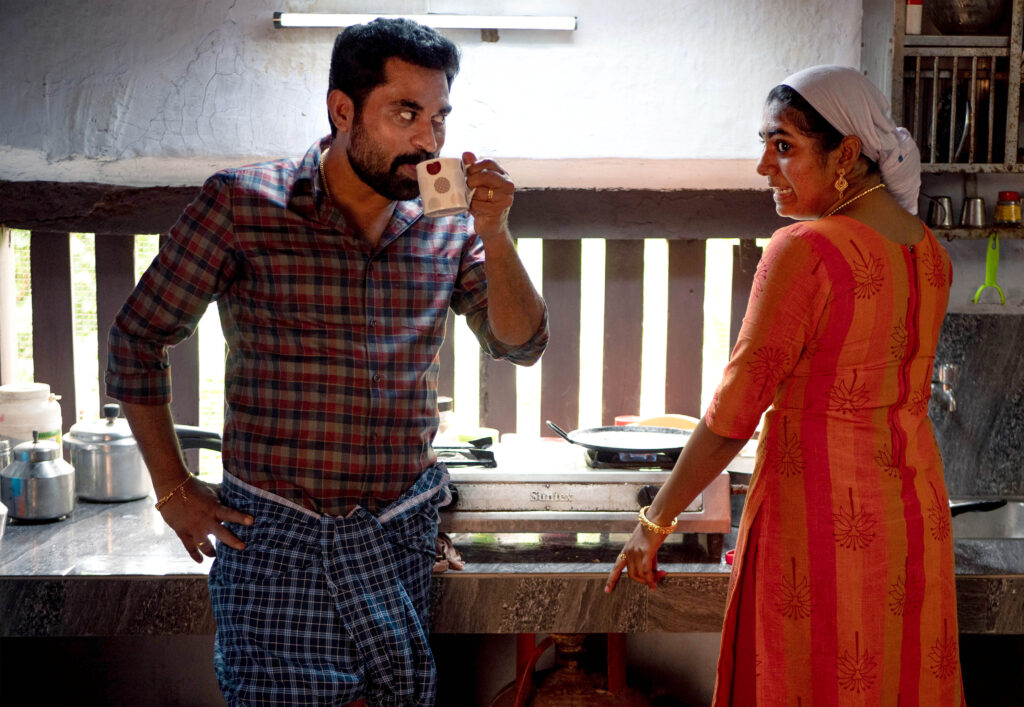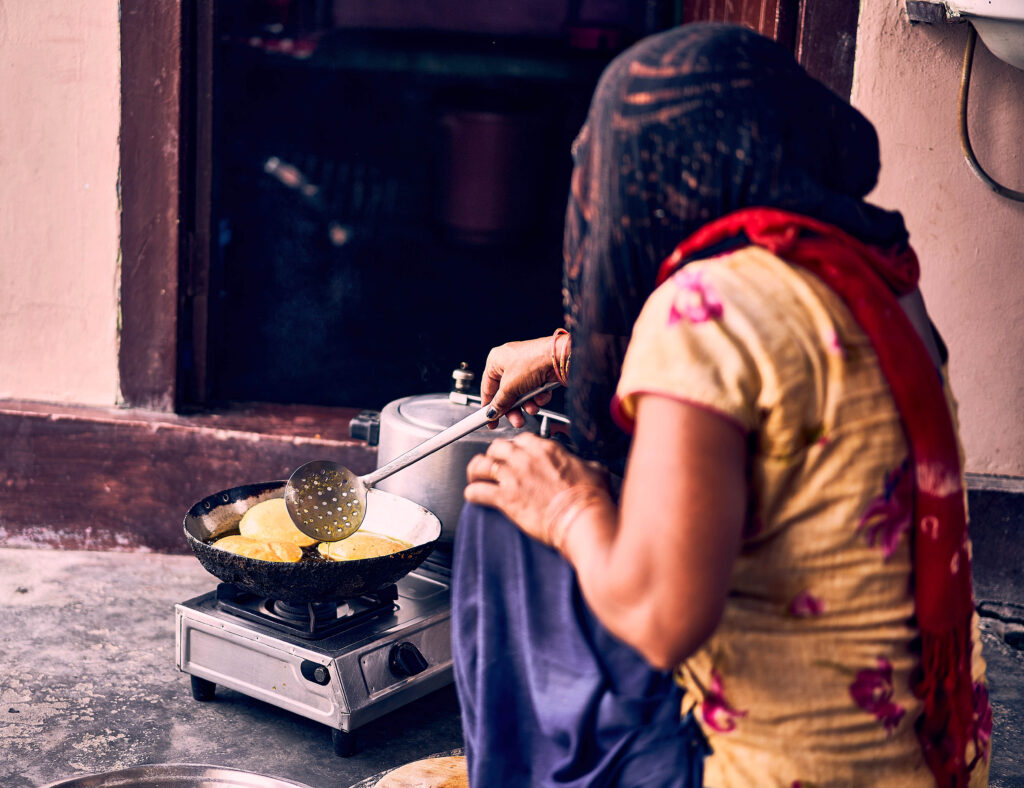
Dijo Augustine remembers how his mother did the lion’s share of housework when he was growing up in Kerala.
“When I look back, I feel sorry for her — she did the chores almost all by herself,” said the mental health therapist, who has co-produced “The Great Indian Kitchen”, a Malayalam film released on a streaming platform recently. “She now lives with us in Canada, and we take care of her in every possible way.”
“The Great Indian Kitchen,” directed by acclaimed Kerala filmmaker Jeo Baby, revolves around a newly-married woman reeling under the drudgery of domestic chores.
She chops vegetables, boils rice, cooks elaborate meals, and cleans. While she spends an inordinate amount of time in a grimy kitchen, that looks like a solitary confinement cell, her husband and father-in-law seem loath to move a muscle, except for doing yoga. The men’s indifference to how a woman struggles with everyday chores continues till the chief protagonist decides that enough is enough.
The film has started conversations in mainstream and social media about unpaid domestic work.
“Some women have messaged us saying that they can relate to the story — one of them said her son had watched the film and offered to help her with housework the very next day,” said Augustine.
Even men have shared their experience of watching the film on social media. One male user tweeted, “#thegreatindiankitchen After watching, wanting to change few things myself (sic)”
Another tweeted, “#TheGreatIndianKitchen screams about the righteousness of some so-called customs and traditions we are cooking and feeding to the children with ingredients which are extinct long back. Must Watch (sic).”
One of the reasons that prompted Augustine and his friends to bankroll the film is the fact that a large section of women across India continues to carry the entire burden of household chores even today.
Statistics show the stark reality. About 159.85 million women declared that household work was their main occupation, compared to only 5.79 million men, according to the 2011 Census in India.
A recent report of the National Statistical Office of the Indian Ministry of Statistics and Programme Implementation, titled Time Use in India 2019, showed that, on average, women spend about 299 minutes a day on unpaid domestic services and 134 minutes on unpaid caregiving for household members, whereas men spend 97 minutes and 76 minutes, respectively.

Legal experts and social activists say that it’s time the wages-for-housework movement gains momentum in India.
“Unpaid domestic work done by homemakers should be quantified and recognized,” said Ranjana Kumari, director of the Centre for Social Research, New Delhi. “We have been arguing this for years now — if this invisible labor is not recognized as work, homemakers won’t be seen as having some agency or autonomy.”
Interestingly, over the past few decades, Indian courts have pointed at ways in which a homemaker’s wage could be determined. They have been awarding compensation for homemakers’ unpaid labor, albeit after their death, when deciding on accident claims cases.
“The issue of fixing notional income for a homemaker serves extremely important functions. It is a recognition of the multitude of women who are engaged in this activity, whether by choice or as a result of social/cultural norms,” a landmark judgment by the Supreme Court of India observed earlier this year.
Deciding on an insurance dispute case, it further noted, “It is to be understood that in such cases, the attempt by the Court is to fix an approximate economic value for all the work that a homemaker does, impossible though that task may be.”
From time to time, while deciding on insurance claims cases, courts have tried to arrive at a figure measuring the economic worth of household work. In one case, a 2001 Supreme Court judgment said that taking into consideration the “multifarious services rendered by the housewives” for managing the entire family, the compensation could be INR 36,000 (about $500) per annum.
Courts have also sought to enhance such compensation by relying on various statistical methods. A 2009 judgment by a Division Bench of the Madras High Court referred to such methods as “opportunity cost” (an evaluation based on what a woman could have earned if she didn’t stay at home) and the “partnership method” (estimating a homemaker’s salary to be half of her husband’s salary).
Despite such rulings, experts say that no cogent effort has been made by the government authorities to fix a monthly income for homemakers when they are alive.
“These cases were focused on homemakers who had died and the only issue before the court was to award compensation to the dependents of the housewife,” said Prabha Kotiswaran, a professor of law and justice at King’s College London.
“The courts did not direct government authorities to take any action possibly because these cases were not writ petitions; these were just cases on appeal from the high court or the Motor Accidents Claims Tribunal,” she said.

Although the Supreme Court did mention that the government should reform family law, it is for the legislature to take it up, she said.
“As a starting point, we could aim for a basic allowance to be paid to all homemakers; it could also be means-tested and payable by the state to improve women’s economic bargaining power within the household,” said Kotiswaran, who studied 200 cases fought under the Motor Vehicles Act 1988 where homemakers died in accidents.
China seems to be showing a way forward in this regard. A divorce court in Beijing has just ordered a man to pay his wife a compensation of 50,000 yuan ($7,700) for five years of unpaid domestic labor, in addition to monthly alimony.
The debate on whether domestic work should stop being unwaged labor seems to have entered the political mainstream in India as well.
Indian actor Kamal Haasan said in December 2020 that his political party was in favor of paying homemakers for housework if it came to power in the 2021 Tamil Nadu Assembly polls.
Not all are in favor though. “we don’t need salary for being the Queens of our own little kingdom our home, stop seeing everything as business. Surrender to your woman she needs all of you not just your love/respect/salary (sic),” Bollywood actor Kangana Ranaut tweeted recently.
In the US, a movement called Marshall Plan For Moms is steadily gathering momentum. In an open letter to US President Joseph R. Biden, the movement’s advocates have called for a “short-term monthly payment to moms” in the wake of the pandemic.
Supported by Hollywood personalities such as Julianne Moore, Charlize Theron, and Eva Longoria, the movement avers, “Motherhood isn’t a favor, and it’s not a luxury. It’s a job.”
(Edited by Anindita Ghosh and Amrita Das)
The post Tikka Look: Movie That Dishes The Dirt On Sexism In The Home appeared first on Zenger News.
